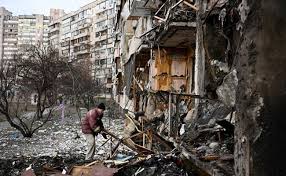According to the Interfax news agency, Russian soldiers took two small cities in southeastern Ukraine and the territory surrounding a nuclear power plant on Monday but ran into stiff resistance elsewhere as Moscow’s diplomatic and economic isolation deepened.
A Ukrainian delegation arrived at the border with Russian ally Belarus for ceasefire talks with Russian representatives after four days of combat and a Russian push that went more slowly than some expected, according to the Ukrainian presidency. It was unclear whether or not any progress could be made.
In the face of a torrent of Western-led retaliation, Russian President Vladimir Putin launched the largest attack on a European state since World War Two on Thursday and put Russia’s nuclear deterrent on high alert on Sunday.
Blasts were heard early Monday in Kyiv, Ukraine’s capital, and Kharkiv, a significant eastern city, according to Ukrainian police. They said that Russian ground forces’ attempts to take major cities had been rebuffed.
The towns of Berdyansk and Enerhodar in Ukraine’s southeastern Zaporizhzhya region, as well as the territory around the Zaporizhzhya nuclear power station, were taken over by Russian soldiers, according to Interfax. The plant’s activities were unaffected, according to the statement.
According to the news agency, Ukraine denied that the nuclear reactor had come into Russian hands.
On Monday, Pavlo Kyrylenko, the chairman of the Donetsk regional administration, stated on television that fighting continued throughout the night surrounding the Ukrainian coastal city of Mariupol.
He didn’t specify whether Russian forces had won or lost terrain, and he didn’t give any estimates for casualties.
Since Thursday, at least 102 civilians have been killed in Ukraine, with another 304 injured, according to UN human rights director Michelle Bachelet, but the true count is likely to be “considerably higher.”
Since Thursday, Russia has fired over 350 missiles against Ukrainian targets, some of which have impacted civilian facilities, according to a senior US defense official.
“It appears like they are adopting a siege mentality,” the official said on condition of anonymity. “Any student of military tactics and strategy would tell you that adopting siege tactics increases the likelihood of collateral damage.”
SANCTIONS
On Monday, Russia’s rouble fell about 30% against the dollar after Western nations announced sweeping measures on Saturday, including the exclusion of some Russian institutions from the SWIFT international payments system.
Russia’s central bank hurried to deal with the sanctions’ growing impact, announcing that it would resume buying gold on the domestic market, run an unlimited repurchase auction, and relax limitations on banks’ open foreign currency balances.
It also instructed brokers to prevent foreigners from selling Russian equities.
China has stated that it will continue to oppose the sanctions. China has repeatedly urged for discussions while refusing to criticize or declare Russia’s incursion on Ukraine an invasion.
Japan and South Korea have stated that they will join the action to prevent some banks from using SWIFT. South Korea, a major semiconductor exporter, announced that it will similarly prohibit the export of strategic items to Russia.
Several European subsidiaries of Sberbank Russia, which is majority-owned by the Russian government, have failed or are about to fail as a result of the war in Ukraine’s reputational cost, according to the European Central Bank.
Britain announced on Monday that it was imposing additional sanctions against Russia in coordination with the US and the EU, effectively cutting off Moscow’s biggest financial institutions from Western markets.
Corporate behemoths reacted as well, with British oil firm BP, Russia’s largest foreign investor, announcing that it would sell its interest in the state oil company Rosneft for up to $25 billion.
PROTESTS
Rolling anti-invasion rallies have taken place around the world, including in Russia, where almost 6,000 people have been jailed at anti-war protests since Thursday, according to the OVD-Info protest monitor.
As more Western states backed sanctions against Russia, diplomatic maneuvering continued, with the Vatican weighing in by proposing to “promote talks” between Russia and Ukraine.
Ukraine’s request for an urgent debate on Russia’s invasion this week was granted by the UN Human Rights Council on Monday, just minutes after Kyiv’s envoy told the Geneva forum that some of Moscow’s military operations “may amount to war crimes.”
After Russia’s ambassador Gennady Gatilov requested a roll call vote, the 47-member council approved the proposal by a vote of 29 in favor, five against (including Russia and China), and 13 abstentions.
Ukraine’s President, Volodymyr Zelenskiy, urged the European Union on Monday to grant Ukraine immediate membership.
“Our goal is to be among all Europeans and, above all, to be on an equal footing. That seems reasonable to me. I am confident that we deserve it “In a video speech that was posted on social media, he remarked.
According to the White House, US President Joe Biden will hold a conference call with allies and partners on Monday to arrange a coordinated response.
Putin is escalating the conflict with “dangerous language” about Russia’s nuclear posture, according to the US, amid signals that Russian forces are prepared to besiege major cities in the democratic country of 44 million people.
Nearly 400,000 civilians, mostly women, and children have fled into neighboring nations as missiles rained down, according to a United Nations relief organization.
Russia refers to its efforts in Ukraine as a “special operation,” claiming that they are not intended to take territory but rather to damage Ukraine’s military capabilities and catch those it considers to be dangerous nationalists.
NATO allies are supplying Ukraine with air defense missiles and anti-tank weapons according to NATO Secretary-General Jens Stoltenberg.
Germany, which had already halted construction of a planned undersea gas pipeline from Russia, announced a major boost in defense spending breaking decades of reticence to match its economic might with military might.
The European Union and Canada have banned all Russian planes from their airspace, forcing Russian airline Aeroflot to postpone all flights to European destinations until further notice.
The Russian media outlets RT and Sputnik were also blacklisted by the EU.

















